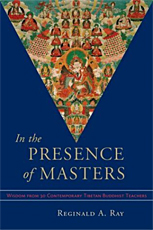"Our human lives are exceedingly precious because they offer us the possibility of discovering our inherent awakeness," Sakyong Mipham Rinpoche states in this outstanding collection of insights by Tibetan Buddhist teachers of Westerners in recent decades. This anthology of brief comments by these sages on a variety of subjects is edited by Reginald A. Ray, Professor of Buddhist Studies at Naropa University in Boulder, Colorado, and a member of the graduate faculty of the Religious Studies Department at the University of Colorado. He has written extensively on the history, philosophy, and practice of Indian and Tibetan Buddhism. The teachings on these pages have come from oral presentations of these men and women in North America, Great Britain, Australia, and Europe. We can only refer to a few of the many memorable passages in this paperback.
For Tibetan Buddhist teachers, there are three major orbs of importance: meditation practice, personal experience, and spiritual realization. In a chapter of observations on making the journey to full realization, Chogyam Trungpa Rinpoche states the importance of a soulmate: "When you live with somebody long enough, there is intense irritation and intense warmth. Often you regard each other as being very cute and sweet, but sometimes as a living devil or devilette. There are a lot of unexplored areas of experience, and you only get to use your microscope with your own mate. With others there's no time to use it. Nobody else will sit there and let themselves be scrutinized and take the trouble to scrutinize you. Only your mate will put up with that, which is a very generous thing, fantastic. So in that way, your mate becomes a spokesman for the rest of the world. That seems to be a very important part of one's life."
Opening up in intimacy to another is something that most Westerners can understand but the Tibetan emphasis upon impermanence is not as easy to assimilate. Here is a description of its meanings by Dzongsar Khytense Rinpoche: "Some people think that Buddhists are pessimistic, always talking about death, impermanence, and aging. But that is not necessarily true. Impermanence is a relief ! I don't have a BMW today and it is thanks to the impermanence of that fact that I might have one tomorrow. Without impermanence, I am stuck with the non-possession of a BMW, and I can never have one. I might feel severely depressed today, and thanks to impermanence, I might feel great tomorrow. Impermanence is not necessarily bad news; it depends on the way you understand it. Even if today your BMW gets scratched by a vandal, or your best friend lets you down, if you have a view of impermanence, you won't be so worried."
Now there is an interpretation that will make perfectly good sense to most people. Other difficult Buddhist topics such as equanimity, compassion, tantric practice, and the role of the teacher are also covered. The photographs of many of these sages that are spread throughout the paperback add a nice personal touch to the book.
